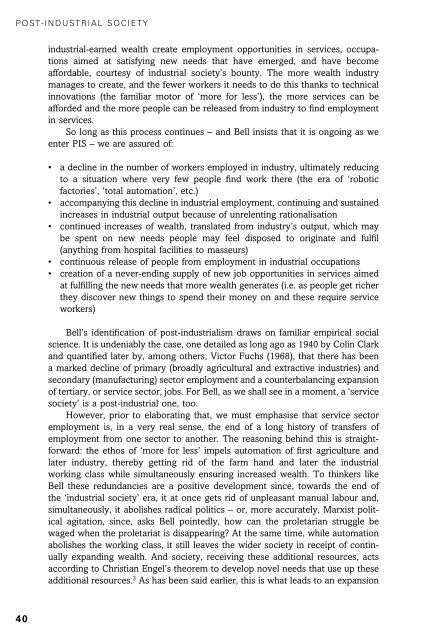Theories of the Information Society, Third Edition - Cryptome
Theories of the Information Society, Third Edition - Cryptome
Theories of the Information Society, Third Edition - Cryptome
Create successful ePaper yourself
Turn your PDF publications into a flip-book with our unique Google optimized e-Paper software.
POST-INDUSTRIAL SOCIETY<br />
industrial-earned wealth create employment opportunities in services, occupations<br />
aimed at satisfying new needs that have emerged, and have become<br />
affordable, courtesy <strong>of</strong> industrial society’s bounty. The more wealth industry<br />
manages to create, and <strong>the</strong> fewer workers it needs to do this thanks to technical<br />
innovations (<strong>the</strong> familiar motor <strong>of</strong> ‘more for less’), <strong>the</strong> more services can be<br />
afforded and <strong>the</strong> more people can be released from industry to find employment<br />
in services.<br />
So long as this process continues – and Bell insists that it is ongoing as we<br />
enter PIS – we are assured <strong>of</strong>:<br />
• a decline in <strong>the</strong> number <strong>of</strong> workers employed in industry, ultimately reducing<br />
to a situation where very few people find work <strong>the</strong>re (<strong>the</strong> era <strong>of</strong> ‘robotic<br />
factories’, ‘total automation’, etc.)<br />
• accompanying this decline in industrial employment, continuing and sustained<br />
increases in industrial output because <strong>of</strong> unrelenting rationalisation<br />
• continued increases <strong>of</strong> wealth, translated from industry’s output, which may<br />
be spent on new needs people may feel disposed to originate and fulfil<br />
(anything from hospital facilities to masseurs)<br />
• continuous release <strong>of</strong> people from employment in industrial occupations<br />
• creation <strong>of</strong> a never-ending supply <strong>of</strong> new job opportunities in services aimed<br />
at fulfilling <strong>the</strong> new needs that more wealth generates (i.e. as people get richer<br />
<strong>the</strong>y discover new things to spend <strong>the</strong>ir money on and <strong>the</strong>se require service<br />
workers)<br />
Bell’s identification <strong>of</strong> post-industrialism draws on familiar empirical social<br />
science. It is undeniably <strong>the</strong> case, one detailed as long ago as 1940 by Colin Clark<br />
and quantified later by, among o<strong>the</strong>rs, Victor Fuchs (1968), that <strong>the</strong>re has been<br />
a marked decline <strong>of</strong> primary (broadly agricultural and extractive industries) and<br />
secondary (manufacturing) sector employment and a counterbalancing expansion<br />
<strong>of</strong> tertiary, or service sector, jobs. For Bell, as we shall see in a moment, a ‘service<br />
society’ is a post-industrial one, too.<br />
However, prior to elaborating that, we must emphasise that service sector<br />
employment is, in a very real sense, <strong>the</strong> end <strong>of</strong> a long history <strong>of</strong> transfers <strong>of</strong><br />
employment from one sector to ano<strong>the</strong>r. The reasoning behind this is straightforward:<br />
<strong>the</strong> ethos <strong>of</strong> ‘more for less’ impels automation <strong>of</strong> first agriculture and<br />
later industry, <strong>the</strong>reby getting rid <strong>of</strong> <strong>the</strong> farm hand and later <strong>the</strong> industrial<br />
working class while simultaneously ensuring increased wealth. To thinkers like<br />
Bell <strong>the</strong>se redundancies are a positive development since, towards <strong>the</strong> end <strong>of</strong><br />
<strong>the</strong> ‘industrial society’ era, it at once gets rid <strong>of</strong> unpleasant manual labour and,<br />
simultaneously, it abolishes radical politics – or, more accurately, Marxist political<br />
agitation, since, asks Bell pointedly, how can <strong>the</strong> proletarian struggle be<br />
waged when <strong>the</strong> proletariat is disappearing? At <strong>the</strong> same time, while automation<br />
abolishes <strong>the</strong> working class, it still leaves <strong>the</strong> wider society in receipt <strong>of</strong> continually<br />
expanding wealth. And society, receiving <strong>the</strong>se additional resources, acts<br />
according to Christian Engel’s <strong>the</strong>orem to develop novel needs that use up <strong>the</strong>se<br />
additional resources. 3 As has been said earlier, this is what leads to an expansion<br />
40
















